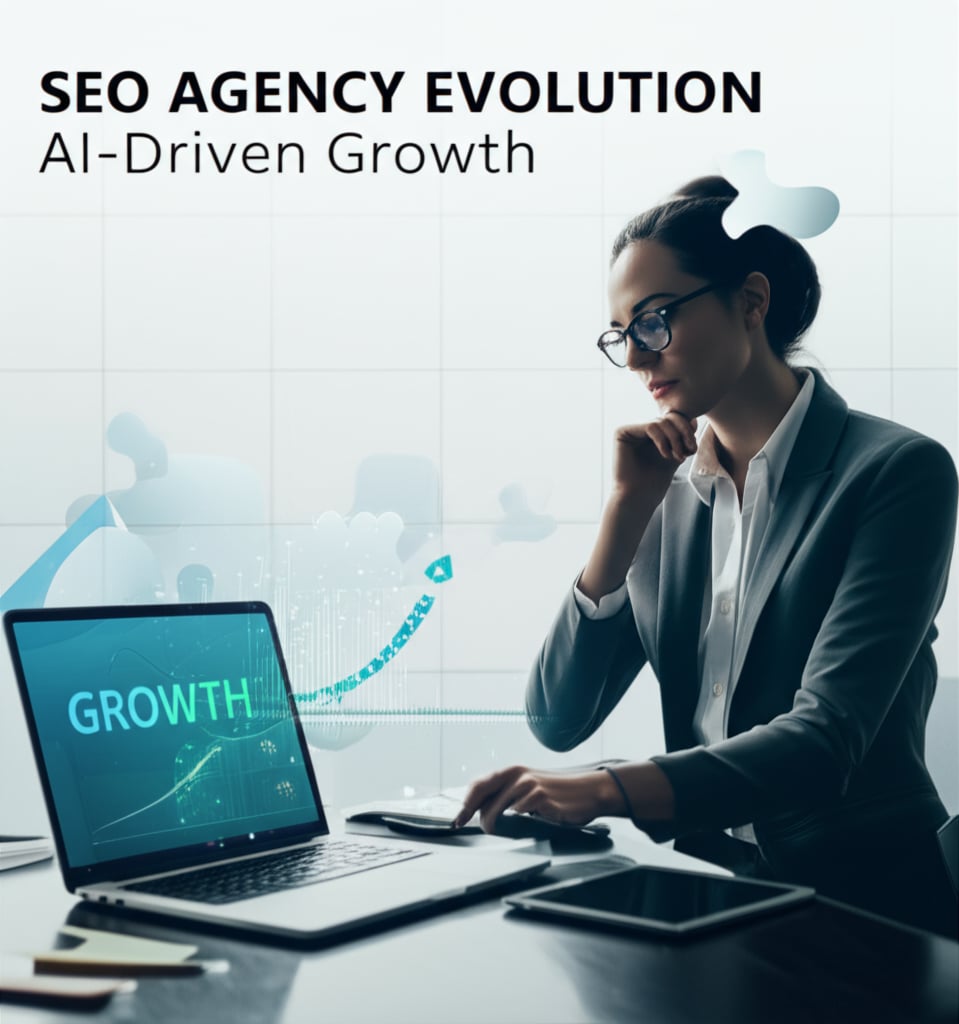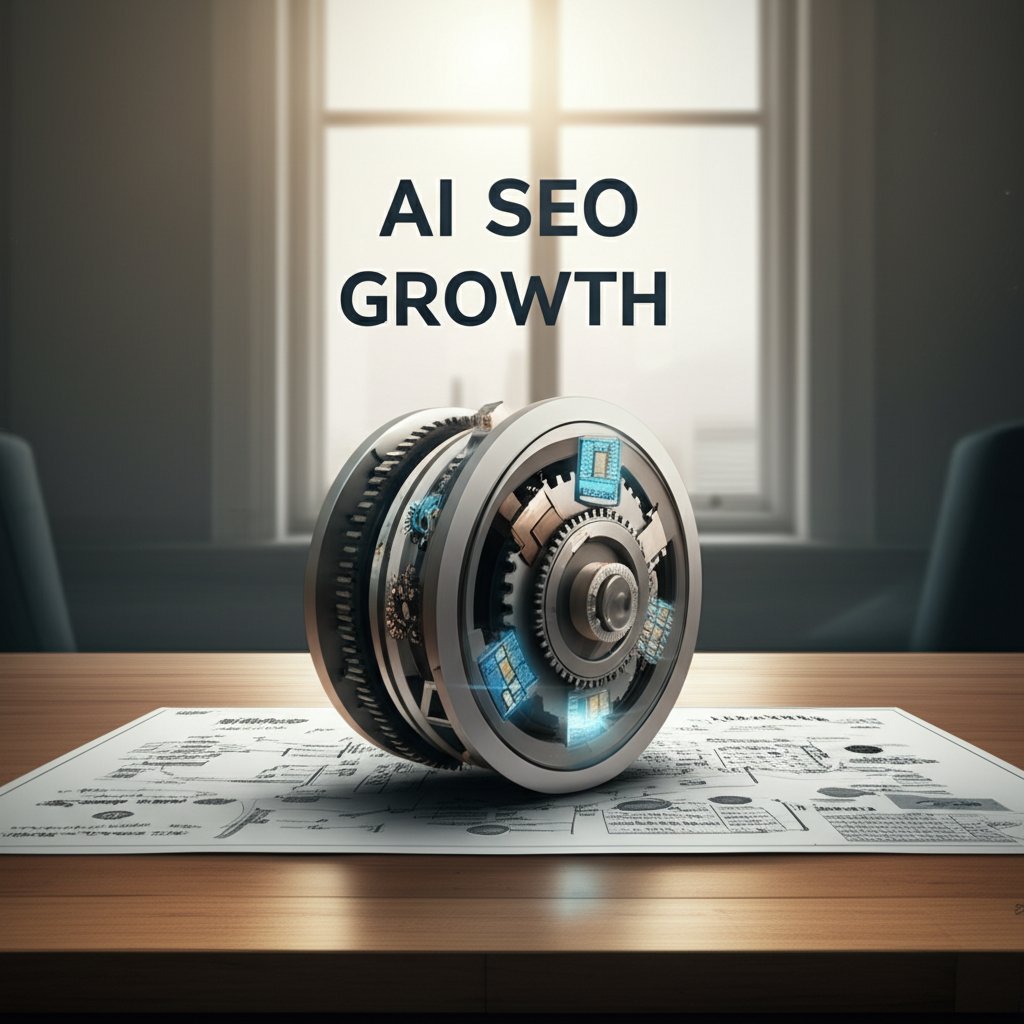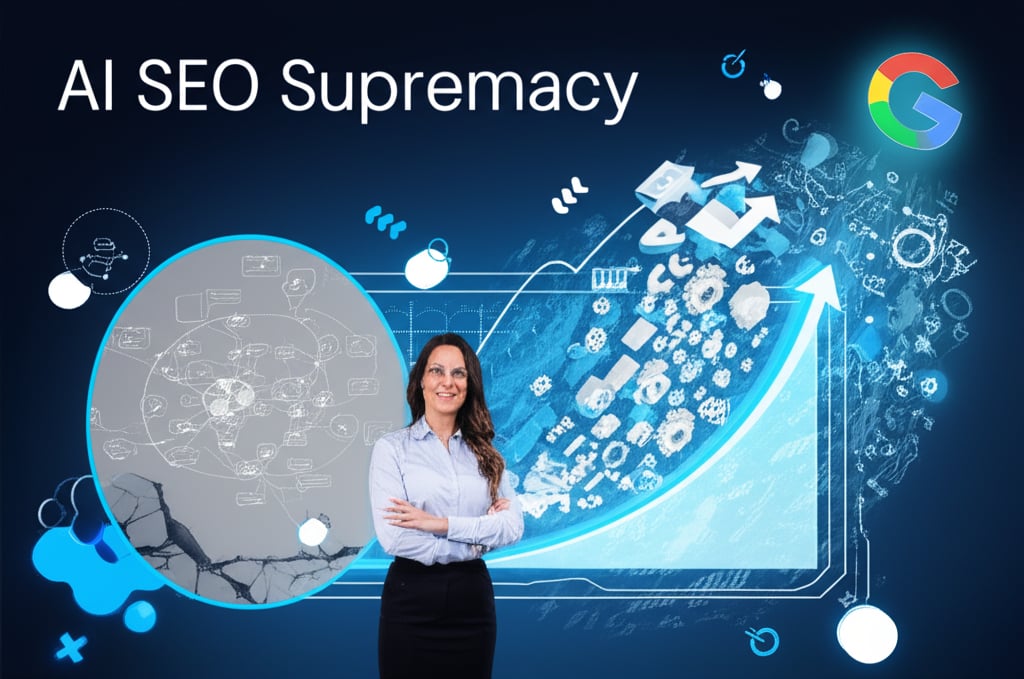The Evolution of SEO: AI-Driven Supremacy for Google Domination
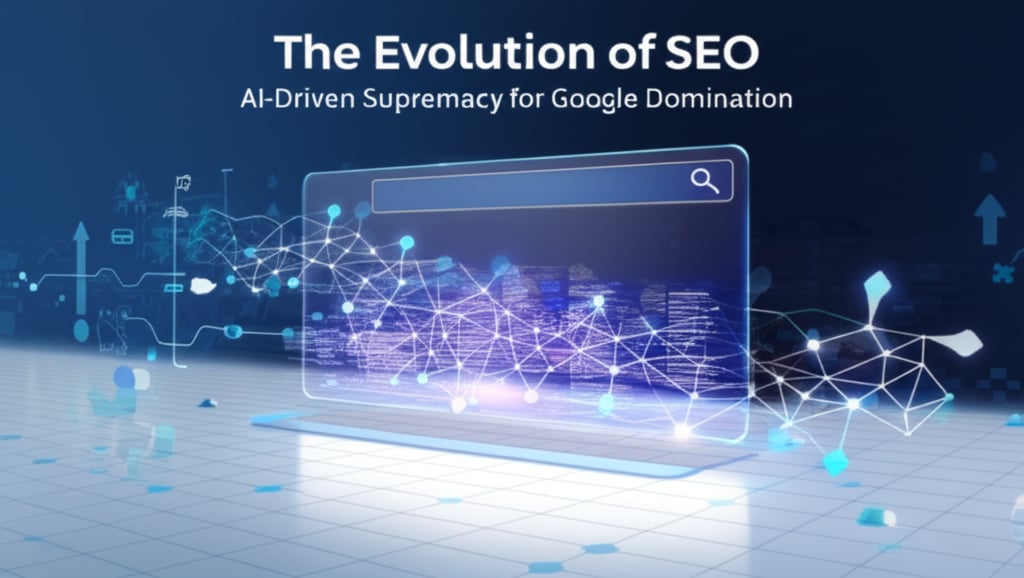
The digital world is undergoing an unparalleled transformation. What was once dominated by painstaking keyword optimization and manual link-building strategies, search engine optimization (SEO) is now rapidly shifting towards advanced automation. Current industry analyses reveal a significant trend: some top-performing organic search results are experiencing up to a 45% reduction in traffic. This decline is largely attributed to the rise of AI-powered summaries, especially for informational queries. This dramatic change necessitates that businesses fundamentally reassess their approach, moving beyond simple click-through rates to a more strategic integration of artificial intelligence.
The Pivotal Shift: From Web Links to AI-Curated Responses
We are witnessing a fundamental change in how users discover and engage with information online. The era of seeing a straightforward list of ten traditional "blue links" is quickly fading, being supplanted by dynamic, AI-generated answers. Advanced search engines, including Google's prominent AI Overviews, synthesize insights from various sources, offering immediate, customized, and often comprehensive responses directly within the search results themselves. This innovation diminishes the need for users to navigate to individual websites, presenting a new challenge for brands striving for visibility and user engagement.
The emergence of Large Language Models (LLMs) such as ChatGPT and Google's Gemini signifies a crucial turning point. These intelligent systems meticulously curate and present information in highly interactive and conversational formats, frequently providing a single, consolidated answer rather than an organized list of web links. This profound alteration in user behavior dictates that modern SEO initiatives must now concentrate not just on achieving high rankings, but on ensuring content is architected for optimal reuse and authoritative citation within these advanced AI environments. The ultimate objective is to establish undeniable brand authority and become the trusted information source that AI systems reference, effectively 'owning the answer' even when a direct click isn't the primary user action.
Key Takeaway: Traditional SEO objectives, once focused on organic clicks, are evolving. Success now demands strategic optimization for AI-generated answers, prioritizing content reusability and an authoritative online presence.
Leveraging AI for Superior Content Creation and Optimization
Artificial intelligence is rapidly becoming the driving force behind high-performance content development. Forward-thinking businesses are no longer just experimenting with AI; they are meticulously designing entire workflows around its capabilities. Advanced LLMs like GPT-4 and Claude 3 facilitate the creation, revision, personalization, and expansion of content at an unparalleled pace, significantly reducing manual effort while dramatically increasing output. Some organizations are now reporting the publication of hundreds, or even thousands, of highly targeted articles each month, leading to substantial reductions in human labor.
The realm of content optimization has experienced a similar revolution. Intelligent algorithms, meticulously trained on extensive datasets of Search Engine Results Page (SERP) performance, dynamically refine content structure, tone, and keyword integration. This ensures that content is not only produced rapidly but also precisely optimized to meet algorithmic expectations, leading to improved engagement metrics and elevated search rankings. The incorporation of real-time search data through powerful APIs further empowers AI models to generate highly relevant, search-intent-driven copy that showcases deep topical authority and semantic richness. The outcome is a remarkably efficient, data-centric content production pipeline that consistently enhances content performance.
OutBlog exemplifies this evolution, acting as an AI collaborator that transforms specialized knowledge into top-ranking articles. Its proprietary multi-stage AI process is a meticulously crafted strategic workflow. It encompasses detailed analysis of search intent, precise identification of content gaps, AI-powered outlining for SEO-optimized structures, and the creation of high-quality content utilizing fine-tuned language models. OutBlog’s sophisticated engine ensures that expert insights are reliably converted into compelling content, systematically establishing market authority without the traditional heavy expenditures of time and cost.
Key Takeaway: AI transforms content creation into a scalable, high-performance operation, moving beyond basic automation to deliver strategically optimized and authoritative content.
Navigating the Dynamic Search Landscape: Voice, Visual, and Beyond

The contemporary search environment is increasingly multimodal, integrating voice commands, visual cues, and real-time data inputs. With a substantial portion of users interacting with voice-enabled devices daily, and visual search tools like Google Lens revolutionizing how information is discovered, brands must extend their optimization efforts beyond conventional text-based strategies. Success on the SERPs now necessitates preparing content for how users speak, see, and explore, not solely for what they type.
Voice queries tend to be lengthier, more conversational, and frequently framed as direct questions. Optimizing for this mode involves structuring content with question-based headings, incorporating comprehensive FAQ sections, and targeting featured snippets to maximize visibility in spoken results. For visual search, paramount importance is placed on high-quality, unique images accompanied by rich metadata, descriptive alt text, and pertinent schema markup. AI-powered vision models categorize and interpret visual content, making machine-readable image data crucial for appearing in visual SERPs.
Schema markup and structured data form the bedrock for AI comprehension across all modalities. These elements enable AI systems, including Google's Multitask Unified Model (MUM) and Gemini, to accurately categorize, index, and present content in enhanced search listings or AI-generated answers. Implementing entity-level markup for products, articles, or local businesses ensures content gains maximum visibility and surface area in this evolving search environment. Brands that adeptly adapt their content to this multidimensional search format will secure a distinct competitive advantage.
Key Takeaway: A strategic approach to AI-driven search demands comprehensive optimization for voice, visual content, and structured data, aligning content with evolving user behavior across multimodal interfaces.
Strategic Superiority: AI-Enhanced Keyword Research and Semantic SEO
AI-powered keyword research goes beyond mere volume-based analysis, prioritizing contextual relevance and genuine user intent. Unsupervised machine learning algorithms dynamically categorize keywords based on semantic relevance and funnel alignment, adapting in real time to emergent trends and identified content gaps. This sophisticated process enables the discovery of high-value, long-tail keywords often overlooked by competitors, providing a significant strategic edge.
Large Language Models further amplify long-tail keyword expansion, generating vast quantities of semantically rich variants precisely tailored to target intents. These models possess the ability to recognize idiomatic expressions and conversational query reformulations that accurately reflect authentic user search behavior. What once demanded extensive manual brainstorming now happens in mere seconds, facilitating the creation of hyper-specific content at an unmatched scale. Furthermore, AI platforms fine-tune keyword strategies to account for device-specific queries, geographical variations, and individual behavioral signals, crafting highly pertinent content that resonates with the searcher's exact context.
Natural Language Processing (NLP) is central to this strategic advancement, guiding search engines like Google to grasp meaning rather than simply matching keywords. Advanced NLP models such as BERT and MUM interpret the subtleties of language, context, and semantic relationships to provide nuanced, multifaceted answers. This extends to internal linking strategies, where NLP-powered tools recommend link placements based on contextual synergy, not just superficial keywords. Developing topic clusters with semantic precision ensures that websites are recognized as definitive authorities, establishing dominance through comprehensive breadth and depth of coverage across a given subject.
OutBlog capitalizes on this intelligence, automating the entire content creation process. From keyword research and topic reports to blog writing, metadata generation, and keyword optimization, OutBlog ensures every article is meticulously engineered for top rankings. It uncovers competitor oversights by identifying high-value, long-tail keywords and generates content that cultivates trust, effectively converting readers into loyal customers. This holistic approach establishes a robust SERP presence and attracts valuable backlinks, consistently securing market authority.
Key Takeaway: AI-powered keyword research and semantic SEO drive strategic dominance by anticipating user intent, expanding long-tail reach, and building deep topical authority through intelligent content structuring.
The Credibility Imperative: E-E-A-T in an AI-Driven World
As artificial intelligence profoundly impacts content generation, the foundational principles of E-E-A-T (Experience, Expertise, Authoritativeness, and Trustworthiness) remain paramount for achieving high rankings on Google. While AI offers unprecedented efficiency, human oversight is absolutely critical to guarantee authenticity, factual accuracy, and strict adherence to these core quality benchmarks. The challenges of misinformation and algorithmic bias necessitate a deliberate, ethically guided approach to AI deployment.
Brands must cultivate proprietary sources of truth, such as internal knowledge bases or original research data, to anchor AI-generated content in verifiable facts. This eliminates speculation and significantly reduces instances of "AI hallucinations." Transparent source attribution and credible human author review, particularly for sensitive or critical topics, are non-negotiable. Robust author bios, structured schema data, and consistent citation practices across all web properties reinforce human expertise and build trust with both users and ranking algorithms. The emphasis is on utilizing AI to amplify human-validated insights, rather than allowing it to replace them.
Furthermore, ethical AI deployment involves rigorously testing content outputs for potential biases, ensuring fairness across diverse demographics, and developing clear internal guidelines for responsible AI utilization. Clearly disclosing AI-assisted content through explicit disclaimers also fosters transparency, further enhancing user trust. This strategic approach ensures that AI is harnessed not merely for achieving scale, but for generating high-quality, credible content that genuinely provides value and establishes an undeniable authoritative presence.
Key Takeaway: Upholding E-E-A-T principles and actively combating misinformation through proprietary data, transparent attribution, and ethical AI deployment is critical for establishing trust and authority in the AI-driven search ecosystem.
Overcoming Operational Challenges: Skill Gaps and Resource Optimization
The rapid evolution of AI in SEO presents considerable operational hurdles for many businesses, including managing skill deficiencies, navigating limited budgets, and contending with overwhelming workloads. Industry surveys consistently highlight these as persistent issues, with numerous marketing teams struggling to keep pace with AI advancements or lacking the internal resources for effective implementation. However, these obstacles can be strategically transformed into distinct opportunities through intelligent automation and targeted skill development.
Addressing Operational Challenges with AI Automation:
- Harness Advanced Automation for the Content Lifecycle: Integrate AI platforms to automate repetitive, time-intensive tasks across the entire content lifecycle. This includes AI-driven keyword research, comprehensive content outlining, drafting, and even direct publication to your website using platforms like WordPress. This frees up human talent to concentrate on high-level strategy, creative direction, and the generation of proprietary insights.
- Strategic Resource Allocation with Evergreen Content: Shift strategic focus towards developing evergreen content that retains its relevance over extended periods. AI can significantly assist in identifying timeless topics and optimizing these pieces for sustained performance, thereby reducing the necessity for constant updates. Complement this with periodic AI-driven content audits to ensure continued freshness and accuracy.
- Invest in Upskilling and Collaboration: Address existing skill gaps by providing targeted training programs focused on AI-driven SEO strategies. Foster robust cross-functional collaboration between SEO, content, and development teams, allowing AI tools to streamline communication and data sharing. Leveraging external expertise, such as consultants specialized in AI implementation, can provide immediate strategic insights while simultaneously upskilling internal teams.
- Optimize Workflows with Integrated Platforms: Utilize comprehensive content automation platforms that seamlessly integrate various SEO functionalities. A solution like OutBlog, for instance, offers a full suite of features ranging from keyword research and content intelligence to blog generation and analytics, centralizing disparate tools into a single, highly efficient engine. Its bulk upload feature enables the simultaneous processing of numerous keywords, producing in-depth blog posts in hours, rather than months.
By strategically deploying AI for high-volume, lower-creativity tasks, businesses can effectively reallocate precious resources, significantly enhance overall productivity, and empower their teams to focus on core strategic objectives. This approach ensures that AI functions as a capability amplifier, not merely a volume multiplier, driving superior results and effectively mitigating operational pressures.
Key Takeaway: Strategic AI automation, continuous upskilling, and integrated platforms are essential for overcoming resource constraints and skill gaps, transforming operational hurdles into powerful competitive advantages.
Redefining Success: Emerging KPIs for AI Visibility
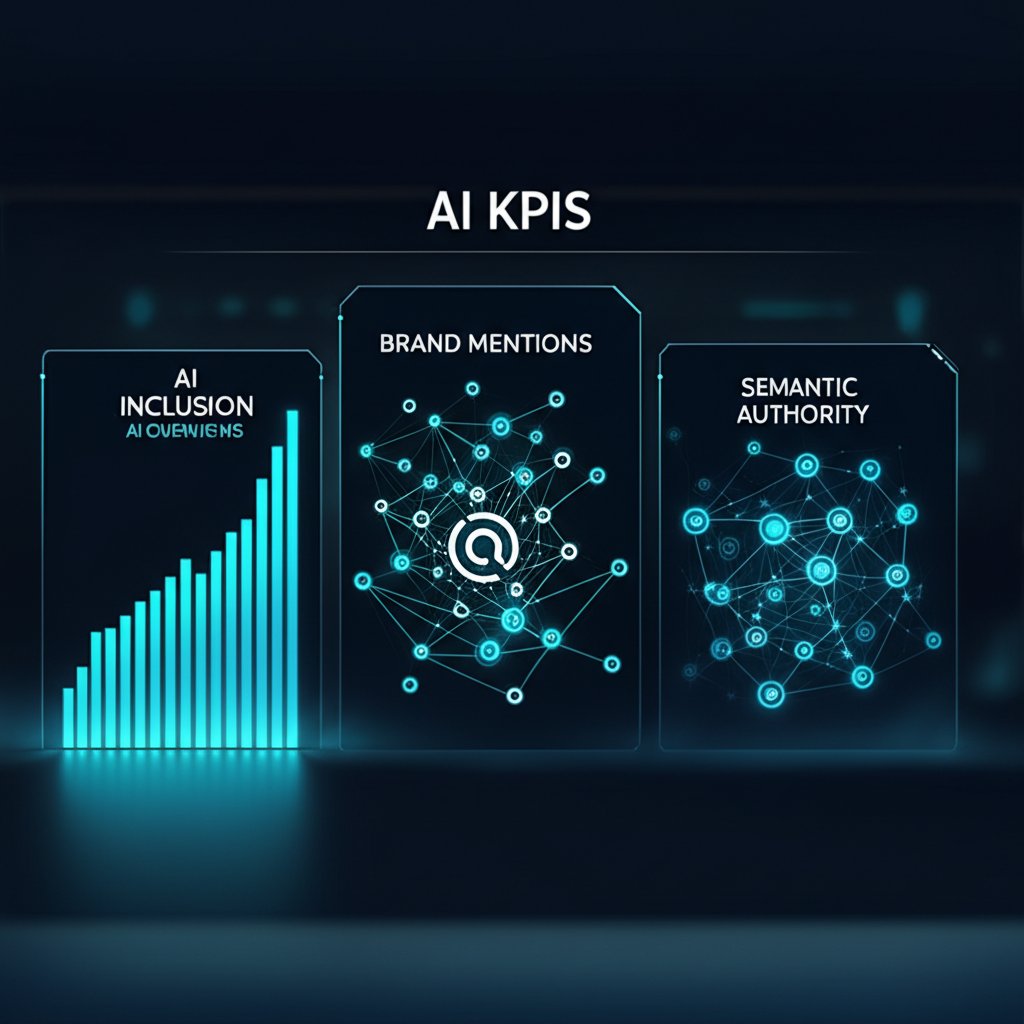
In the rapidly evolving search landscape, traditional SEO metrics alone no longer fully encapsulate a brand's true influence. While organic traffic figures and keyword rankings remain important, genuine success in the AI era demands an expansion of Key Performance Indicators (KPIs) to accurately reflect visibility within generative AI systems. This new paradigm emphasizes owning the definitive answer and becoming a recognized authority for AI models, even if that doesn't always translate into a direct click.
New KPIs crucial for the AI era include:
- Inclusion in AI-Generated Answers: This metric precisely tracks how often a brand or its content is cited, referenced, or synthesized within AI Overviews, ChatGPT responses, and other LLM outputs. It directly reflects answer ownership and demonstrates semantic authority.
- Brand Mentions Across High-Authority Sources: AI models inherently prioritize content quality, clarity, and relevance, often valuing mentions in trusted third-party publications (like Wikipedia or reputable industry blogs) even in the absence of direct backlinks. Shifting focus from mere link-building to strategic mention-building is now crucial.
- Semantic Authority and Topical Depth: Measuring the comprehensive depth and thoroughness of a brand's content on a specific topic, indicating its perceived expertise and authoritativeness by AI systems.
- Share of Voice in AI Platforms: Actively monitoring a brand's presence and influence across diverse AI search tools, tracking how frequently it is referenced or recommended by these intelligent systems.
Consider 'Apex Innovations,' a hypothetical leader in sustainable technology. By leveraging an advanced AI content engine, they not only boosted their content output fivefold but also strategically focused on developing high-quality, genuinely authoritative pieces. This unwavering commitment resulted in a remarkable 40% surge in organic traffic within just six months, a sevenfold increase in qualified lead generation, and, most importantly, consistent citation within AI Overviews for their core industry terms. This compelling example demonstrates how integrated AI strategies yield tangible, measurable returns, effectively redefining market leadership in the modern digital ecosystem.
Tracking these emerging KPIs often requires a sophisticated blend of manual prompt testing across various LLMs and the development of specialized analytics tools. Implementing UTM parameters for traffic originating from AI platforms can help measure direct engagement, while monitoring brand mentions through advanced listening tools provides invaluable insights into overall AI visibility. This strategic re-evaluation of success metrics ensures that businesses remain agile and competitive, actively shaping their presence in an AI-driven search world.
Key Takeaway: The new frontier of SEO demands a fundamental shift in KPIs to prioritize AI inclusion, strategic brand mentions, and semantic authority, reflecting a comprehensive strategy for influence beyond traditional clicks.
Conclusion
The evolution of SEO from manual, labor-intensive operations to AI-driven supremacy is far more than a passing trend; it represents a fundamental re-engineering of the entire digital marketing landscape. The strategic imperative for businesses is unequivocally clear: embrace intelligent automation to adeptly navigate the complexities of generative search, multimodal queries, and the heightened demand for content aligned with E-E-A-T principles. The capacity to anticipate user needs, generate high-quality content at scale, and ensure consistent brand authority through AI is now the definitive pathway to securing market leadership.
Platforms like OutBlog stand as an essential engine in this dynamic new era. By expertly transforming niche expertise into top-ranking articles, identifying competitor blind spots, and automating the entire content lifecycle, OutBlog provides an unfair competitive advantage. It empowers ambitious founders, lean marketing teams, and forward-thinking SEO agencies to achieve unparalleled search visibility, drive a consistent flow of qualified leads, and establish undeniable authority. The future unquestionably belongs to those who leverage AI not merely as a tool, but as a strategic co-pilot for achieving Google domination.
This is the pivotal moment to transition from merely participating in the digital conversation to truly leading it. With cutting-edge solutions like OutBlog, powered by innovative entities, businesses can significantly accelerate their market conquest, ensuring their content is not just discovered, but consistently dictates the conversation in our increasingly AI-powered world.
